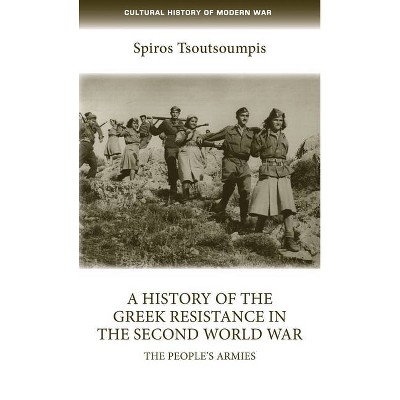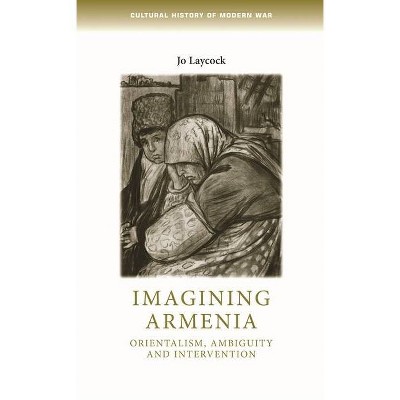A History of the Greek Resistance in the Second World War - (Cultural History of Modern War) by Spiros Tsoutsoumpis (Paperback)

Similar Products
Products of same category from the store
AllProduct info
<p/><br></br><p><b> About the Book </b></p></br></br>This book tells the story of the Greek resistance to Axis occupation during the Second World War and in particular the life of armed guerrillas. Rather than provide a conventional military history it will illuminate for the first time the lives, experiences and thoughts of the resistance fighters during their fight against the Occupation.<p/><br></br><p><b> Book Synopsis </b></p></br></br><p><em>A history of the Greek resistance in the Second World War</em> discusses one of the most troubled and fascinating aspects of modern Greek and European history: the anti-axis resistance. It is a pioneering history of the men and women who waged the struggle against the axis and provides a comparative study of the guerrilla armies of ELAS and EDES. <br /> <br /> Previous studies have either neglected the study of the guerrilla armies altogether or focused on their political and operational activities. As a result we know very little about the lives, experiences and beliefs of the men and women within these groups, their provisioning, leisure and relations with the civilian population. <em><em>A history of the Greek resistance in the Second World War</em> </em>delves into this unexplored area and provides new insights on the formation of the resistance movements and the experiences of the guerrilla fighters. The book follows the guerrillas from enlistment to the battlefield, examining the rise and origins of the resistance armies and how they governed their territories. It explores how their experiences of hardship, combat and personal loss shaped their self-image and social attitudes, the complex reasons that led partisans to enlist and fight, and relations between the guerrillas and the civilian population.<br /> <br /> Existing studies have presented the guerrillas as political soldiers and underscored the importance of ideology in motivation and morale. <em><em>A history of the Greek resistance in the Second World War</em> </em>offers a more complex image and looks at a series of factors that have been neglected by scholars including kinship and group ties, violence, religious beliefs and leadership. The book will appeal to both academics and general readers interested in the Greek resistance, military history and the history of resistance movements during the Second World War.</p><p/><br></br><p><b> From the Back Cover </b></p></br></br><i>A history of the Greek resistance in the Second World War</i> discusses one of the most troubled and fascinating aspects of modern Greek and European history: the anti-axis resistance. It is a pioneering history of the men and women who waged the struggle against the axis and provides a comparative study of the guerrilla armies of ELAS and EDES. Previous studies have either neglected the study of the guerrilla armies altogether or focused on their political and operational activities. As a result we know very little about the lives, experiences and beliefs of the men and women within these groups, their provisioning, leisure and relations with the civilian population. <i>A history of the Greek resistance in the Second World War </i>delves into this unexplored area and provides new insights on the formation of the resistance movements and the experiences of the guerrilla fighters. The book follows the guerrillas from enlistment to the battlefield, examining the rise and origins of the resistance armies and how they governed their territories. It explores how their experiences of hardship, combat and personal loss shaped their self-image and social attitudes, the complex reasons that led partisans to enlist and fight, and relations between the guerrillas and the civilian population. Existing studies have presented the guerrillas as political soldiers and underscored the importance of ideology in motivation and morale. <i>A history of the Greek resistance in the Second World War </i>offers a more complex image and looks at a series of factors that have been neglected by scholars including kinship and group ties, violence, religious beliefs and leadership. The book will appeal to both academics and general readers interested in the Greek resistance, military history and the history of resistance movements during the Second World War.<p/><br></br><p><b> Review Quotes </b></p></br></br><br>'This is an excellent analysis of the social conditions that gave birth and contributed to the development of the Greek guerrilla during the German occupation. Through a detailed and in-depth analysis of the elements that prevailed in the countryside, Tsoutsoumpis presents an impressive study of the armed resistance and the following civil war between the communist guerrillas and the anticommunist forces in Greece throughout the period of the Second World War.' Nikos Marantzidis, Associate Professor of Balkan, Slavic and Oriental Studies at the University of Macedonia in Thessaloniki (Greece) and Visiting Professor of History at Charles University in Prague ' <i>A History of the Greek Resistance</i> is a rich and welcome book that brings new and invaluable insights to the historiography of the resistance movement in occupied Greece.' Christopher Kinley, <i>H-War</i><br><p/><br></br><p><b> About the Author </b></p></br></br><br><strong>Spyros Tsoutsoumpis </strong>is an Honorary Research Fellow at The University of Manchester, an Advance Academia Fellow at the Centre for Advanced Studies in Sofia, and the recipient of a Harry Frank Guggenheim Foundation Fellowship<br>
Price History
Price Archive shows prices from various stores, lets you see history and find the cheapest. There is no actual sale on the website. For all support, inquiry and suggestion messagescommunication@pricearchive.us




















